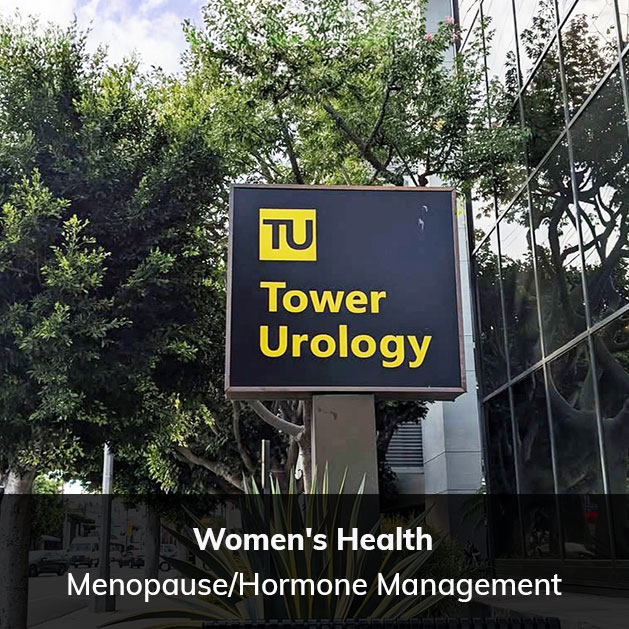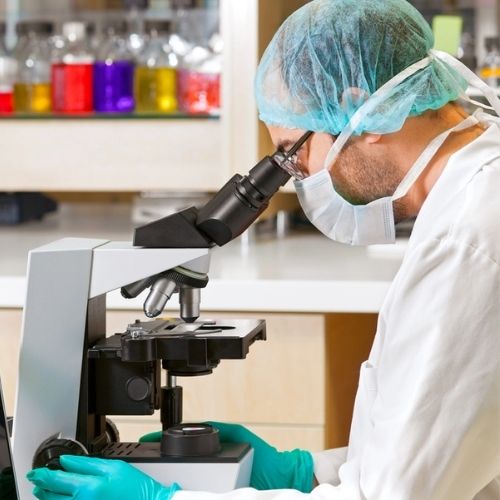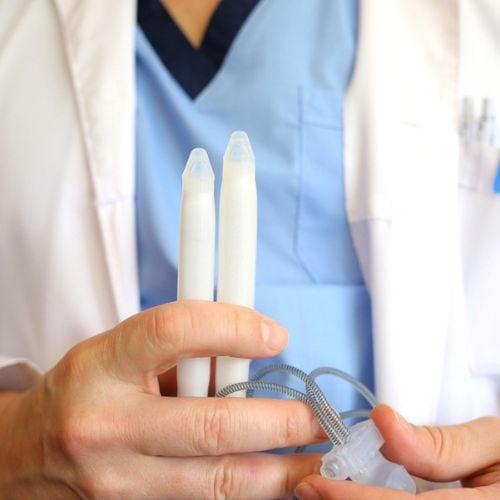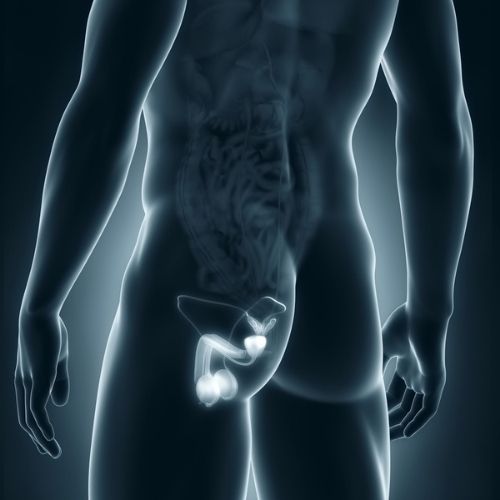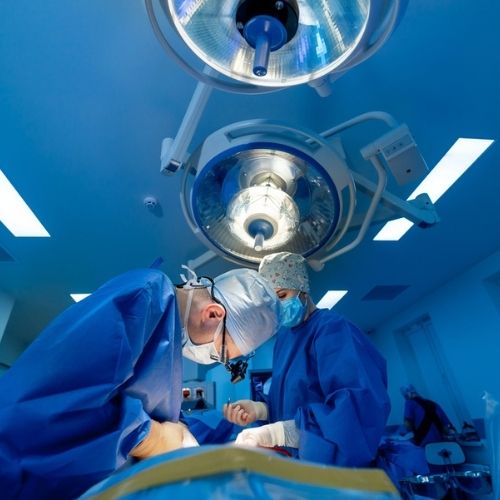What is hormone replacement therapy (HRT)?
Menopause marks a significant transition in a woman’s life and is often accompanied by a range of symptoms that can profoundly affect her quality of life, both physically and emotionally.
It’s estimated that over 75 million women in the U.S. are currently in perimenopause or menopause, yet fewer than 25% of women seek treatment for their symptoms, and a large proportion of those who do seek help may not receive adequate support.
At Tower Urology, our team is committed to changing that. Dr. Kuhlmann is dedicated to giving women the treatment they deserve during this challenging time in every woman’s life.

Benefits to starting hormone replacement therapy (HRT) early in your menopause journey include prevention of atherosclerosis and osteoporosis, decreased need to take antidepressants later in life, preservation of sexual function, and treatment of bothersome symptoms.
We also treat postmenopausal women with a focus on hormone replacement therapy or HRT (also referred to as menopausal hormone therapy or MHT) and a full range of treatment options to help manage symptoms and potentially provide other health benefits.
No matter where you are in the menopause transition (even if you’ve only missed a period or two or are having a few per month), don’t hesitate to seek support, discuss your symptoms, and get appropriate treatment tailored to your individual needs.
What are the stages of menopause?
The menopause process can be divided into three stages:
- Perimenopause: This stage typically begins in your 40s and many years before actual menopause (when periods stop altogether). Over time, your ovaries produce less estrogen, which often leads to irregularities in your menstrual cycle and other, sometimes troubling symptoms, such as hot flashes, disturbed sleep, and mood changes.
- Menopause: Menopause is officially reached when you have not had a period for 12 consecutive months. This marks the official end of your reproductive years, as the ovaries produce little estrogen and no longer release eggs.
- Postmenopause: This stage begins immediately after menopause, and some symptoms experienced in perimenopause may ease or cease altogether. However, some symptoms may persist, and you may face new health concerns.
What are the symptoms of menopause?
A woman’s transition to menopause, or perimenopause, usually begins in her mid-40s but can start earlier and can last for several years. Throughout perimenopause, menstrual cycles become irregular, and hormonal fluctuations can cause a wide variety of sometimes debilitating symptoms.
Common symptoms include:
- Hot flushes and night sweats (vasomotor symptoms)
- Urinary incontinence and frequent urinary tract infections
- Vaginal dryness, burning, and irritation
- Reduced libido, difficulty with arousal, and pain during sexual activity
- Sleep disturbances, fatigue, and mood swings
- Weight gain and bone loss
- Joint pain, muscle stiffness, and headaches
- Cognitive issues such as memory problems and brain fog
- Heart palpitations and changes in blood pressure
- Thinning hair, brittle nails, and skin changes
During this time, a woman may also experience emotional distress and changes in relationships, which makes a comprehensive, compassionate approach to care essential.
Menopause and sexual health
One of the most under-discussed but commonly reported impacts of menopause is the effect it has on a woman’s sexual health. Genitourinary syndrome of menopause, or GSM, is a condition caused by a decrease in estrogen levels, which can lead to changes in the external genitals, vagina, and lower urinary tract.
Declining levels of estrogen and testosterone can also affect sexual arousal and orgasm, and many women experience physical discomfort or pain during sex, leading to a cycle of avoidance and distress. This can devastate a woman’s sense of self and adversely affect her relationship with her partner.
In Dr. Kuhlmann’s experience, one of the first things many women say when they attend her clinic is how distressing it is not to be able to enjoy or engage in sex at all. This anxiety extends beyond their anguish to concern for their partners’ happiness as well.
There are already associations between depressed mood and menopause, and the loss of sexuality and the inability to maintain intimacy in relationships often compound these negative emotional symptoms.
At Tower Urology, we treat these concerns seriously. Addressing the impact these changes in intimacy have on a woman and her relationship is an essential step to restoring confidence and sexual wellness during menopause.
Understanding hormone replacement therapy

Hormone replacement therapy (HRT) (sometimes referred to as menopause hormone therapy or MHT) is often used during perimenopause to relieve symptoms caused by declining estrogen levels. While it primarily helps to ease hot flashes and night sweats, it can also help with other symptoms like vaginal dryness, changes in libido, and sleep disturbances.
There are two primary forms of HRT used in menopause: systemic hormone therapy and local hormone therapy. Both use FDA-approved bioidentical hormones, meaning they are chemically identical to those produced naturally in the body. Each approach is tailored to the individual based on medical history, risk factors, and personal goals.
Systemic hormone therapy
Systemic HRT increases hormone levels throughout the body and is used to treat broader symptoms of menopause, including hot flashes and night sweats. There are different types of HRT, and choosing the right one depends on whether a woman has had a hysterectomy, her risk for cardiovascular disease, uterine cancer, or liver disease, and her overall health.
Systemic therapy can be delivered as low-dose patches, gels, sprays, rings, oral tablets, or implanted pellets. Many women start with low doses of estrogen and gradually increase the dose based on how well their symptoms are managed. Individualizing the doses of estrogen and accompanying hormones is key to minimizing health risks while maximizing benefits.
Local hormone therapy
Local estrogen therapy is applied directly to the vaginal area, often in the form of a vaginal cream, suppository, or ring. It effectively treats symptoms of GSM, such as:
- Vaginal dryness
- Urinary urgency
- Recurrent UTIs
- Painful sex due to tissue thinning
Because it does not raise systemic estrogen levels, local therapy is considered safe, even for many women with a history of breast cancer. However, it does not treat hot flashes, mood changes, or bone loss.
Hormones commonly replaced:
- Estrogen alone (for women without a uterus)
- Estrogen + Progestin or Progestogen (for women with a uterus, to protect the uterine lining)
- Testosterone (in select cases, for low libido and arousal issues)
What to expect starting hormone replacement therapy
With hormone replacement therapy, there is no playbook on exactly what changes you’ll experience and when.
When you first come in, we’ll examine you and test your hormone levels for a baseline. Dr. Kuhlmann will usually start with local hormone replacement therapy, then add systemic hormone replacement with estrogen +/- progesterone, followed by testosterone replacement if needed.
Typically, local hormone treatment with vaginal estrogen takes about six weeks to see an appreciable benefit, with maximal effect after 2-3 months of use. Initially, you may experience less skin irritation and improved lubrication, with the impact on voiding function and urinary tract infections taking longer to become apparent.
For systemic hormone replacement with estrogen +/- progesterone, you can expect to notice some improvement in menopause symptoms in about two weeks. If you haven’t seen any effect by six to eight weeks, you may need to check blood hormone levels to ensure your administration method is working and the HRT is properly absorbed.
For testosterone replacement therapy, it takes four to six months to notice an improvement. But if you stick with it, it truly has the power to give you back your sex drive.
Hormone replacement therapy for menopause — pros and cons
When started within the first 10 years of menopause or before age 60, MHT has been shown to reduce the risk of osteoporosis, early menopause complications, and even heart disease. It also significantly improves vasomotor symptoms, sexual function, sleep, and mood.
However, there are risks to be considered:
- Combined estrogen-progestin therapy may slightly increase breast cancer risk with long-term use.
- Oral estrogen may elevate the risk of stroke or blood clots, especially in women with a history of cardiovascular disease.
- Depending on the condition being treated, some selective estrogen receptor modulators (SERMs) may offer benefits with a lower risk profile.
Each woman’s situation is unique. That’s why follow-up and ongoing monitoring are essential when beginning HRT. We assess treatment outcomes regularly and adjust as needed to ensure effective treatment with minimal side effects.
What if you can’t take hormones?
Some women cannot take hormone therapy due to a history of breast cancer, liver disease, or other health risks. In these cases, non-hormonal therapies such as SSRIs, SNRIs, gabapentin, or SERMs can help manage symptoms like hot flashes and mood changes.
Other supportive treatments include:
- Vaginal moisturizers and lubricants
- PRP (Platelet-Rich Plasma) injections for sexual rejuvenation
- Lifestyle changes to manage risk factors for heart attack, stroke, and bone loss
Need help with menopause and hormone management? Contact Tower Urology in Los Angeles!
At Tower Urology, our women’s health experts provide comprehensive, personalized care for women navigating menopause.
Whether you’re experiencing early symptoms, dealing with years of unresolved menopause-related issues, or simply seeking clarity on your options, our compassionate and expert approach ensures that you’re never alone on your journey.
Tower Urology’s doctors are conveniently located for patients throughout Southern California and the Los Angeles area, Beverly Hills, Santa Monica, West Los Angeles, West Hollywood, Culver City, Hollywood, Venice, Marina del Rey, and Downtown Los Angeles.
Tower Urology is a proud affiliate of Cedars-Sinai Medical Center, ranked #1 in California and #2 in the nation by U.S. News & World Report. This partnership reflects our commitment to delivering the highest standard of urologic care with the best urologists in Los Angeles. Our years of experience and access to Cedars-Sinai’s world-class facilities and our exceptional, innovative, and state-of-the-art urological care make Tower Urology a leader in Southern California.
We invite you to establish a care plan with Tower Urology.
chemically identical to those produced naturally in the body. Each approach is tailored to the individual based on medical history, risk factors, and personal goals.
Our services include treatment for pelvic organ prolapse, menopause/hormone management, chronic pelvic pain syndrome in women, shockwave therapy for pelvic pain, interstitial cystitis, lichen sclerosis and planus, urethral diverticulum, urethral stricture disease, urinary fistulas, and vaginal mesh complications.
Menopause and Hormone Replacement Therapy FAQs
When considering HRT and menopause, therapy is most beneficial when started before age 60 or within 10 years of menopause. Early initiation reduces the risk of osteoporosis, heart disease, and severe vasomotor symptoms.
Breast cancer risk may be slightly elevated with combined estrogen-progestin therapy over long periods, particularly after five years of use. However, estrogen alone in women without a uterus may have a neutral or even protective effect. The risk varies depending on the type of HRT and individual medical history.
Low sex drive and menopause are commonly linked due to decreased estrogen and testosterone levels, which affect libido, arousal, and vaginal comfort. The use of HRT and other targeted treatments can help restore sexual desire and improve overall intimacy.
Women who have had a hysterectomy may only need estrogen therapy, as there is no risk of uterine or ovarian cancer. This simplifies treatment and may reduce certain risks.
High doses of synthetic oral hormones, like those found in birth control pills, increase your blood levels of a molecule called sex hormone-binding globulin (SHBG). This molecule binds testosterone, which is a very important contributor to sexual desire/libido. When SHBG binds to your body’s testosterone, it makes it inactive, which is why oral hormones not only don’t improve your libido but may cause it to decrease.
Synthetic oral hormones also have an increased risk of blood clots and stroke compared to the other forms of estrogen replacement.
There is no universal end date for HRT. Many women continue therapy into their 60s or beyond, depending on their symptoms and preferences. Regular follow-up with our healthcare providers helps determine when and how to taper treatment.
Sources
Postmenopausal Hormone Therapy: An Endocrine Society Scientific Statement
https://pmc.ncbi.nlm.nih.gov/articles/PMC6287288/
Breast Cancer Risk in Relation to the Interval Between Menopause and Starting Hormone Therapy
https://pmc.ncbi.nlm.nih.gov/articles/PMC3039726/
Menopause
https://www.ncbi.nlm.nih.gov/books/NBK507826/
It’s time for the FDA to remove the outdated, misleading “boxed warning” label on local vaginal estrogen products!
https://www.letstalkmenopause.org/unboxingmenopause

